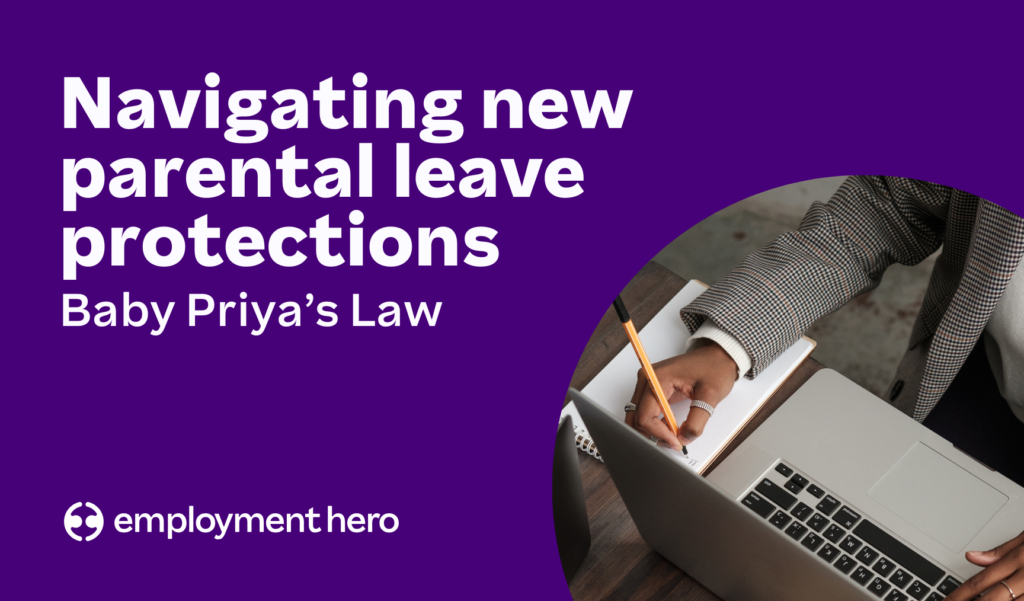Navigating new parental leave protections: Baby Priya’s Law

Contents
Parental leave is a crucial time for employees to bond with their new child. But what happens when that precious time is cut short by tragedy? For employers, navigating these sensitive situations with compassion is essential.
The Australian Government has introduced new legislation to protect employees in the heartbreaking event of stillbirth or infant death. Known as “Baby Priya’s Law,” these changes to the Fair Work Act ensure that employees receiving employer-funded paid parental leave are supported during their time of grief.
For business owners, staying on top of legislative changes is a constant challenge. This guide explains exactly what these new protections mean for you and your team, allowing you to lead with confidence and care.
Baby Priya’s Law: An overview of the new protections
The Fair Work Amendment (Baby Priya’s) Act 2025 introduces new protections for employees who plan to take, or are already on, employer-funded paid parental leave.
The core of this law is simple. If an employee’s child is stillborn or dies, an employer cannot refuse or cancel the employer-funded paid parental leave they would have otherwise been entitled to. This protection is designed to give grieving parents financial stability and the time they need to recover, without the added stress of losing their leave entitlements.
These changes bring employer-funded schemes in line with the existing protections for unpaid parental leave under the National Employment Standards (NES). Employees are already protected from having unpaid parental leave refused or cancelled in the event of infant death or stillbirth.
The new law goes some way to reinforce support for working families during their most difficult moments, however it will still be possible for employers to refuse or cancel company-funded leave in the event of stillbirth or infant death where this right has been expressly agreed with employees. In other words, it will not alter existing contractual agreements or the ability to enter into new ones covering this area.
The new law’s main impact will be that where a company-funded parental leave policy is silent or unclear on the employee’s rights to take the leave in the event of stillbirth or infant death, the new laws make it crystal clear that employers cannot cancel or refuse the leave without the employee’s agreement.
It is also important to note that the new laws do not require employers to introduce company-funded parental leave. This is still a matter completely at the discretion of the employer.
Key changes for employers
Understanding the details of Baby Priya’s Law is crucial for managing compliance and supporting your employees effectively. Here are the key changes you need to be aware of.
Protection against refusal or cancellation
The new law prohibits an employer from refusing or cancelling an employee’s approved employer-funded paid parental leave due to a stillbirth or the death of their child.
This protection applies if:
- The employee would have been entitled to company-funded parental leave under their existing terms and conditions of employment if the child had not died.
- The leave is associated with the birth of the employee’s child, their spouse’s or de facto partner’s child or the placement of an adopted child.
The new laws mean an employer can only cancel the leave if the employee requests it, subject to a few important exceptions explained below.
Effective date
These new protections apply to any stillbirth or infant death that occurs on or after 7 November 2025.
Potential penalties for employers
Failing to comply with these new protections is a breach of the Fair Work Act. Employers who unlawfully refuse or cancel an employee’s parental leave under these circumstances could face significant civil penalties.
Are there exceptions to the protection?
Yes, there are a few specific exceptions where the new protections do not apply. However, these are narrow and should be navigated with caution.
Pre-existing terms and conditions
The protection doesn’t apply if your existing terms and conditions of employment, set before 7 November 2025, already specify that employer-funded paid parental leave can be refused or cancelled in the event of a stillbirth or infant death. This will still be allowed going forward. Clauses in existing policies and employment contracts will not automatically become void.
However, an employer is not able to unilaterally amend their existing terms and conditions after 7 November 2025 to avoid the protections of the new laws.
In other words, if an employer has a workplace policy which currently says that employer-funded paid parental leave cannot be refused or cancelled in the event of a stillbirth or infant death, the employer is not able to change such a policy to introduce a right to refuse or cancel the leave, unless employees agree to this change.
It is also important to understand that the new laws do not prevent future agreements by employers and employees that give employers the right to cancel or refuse leave. However, an employer and employee would have to specifically agree to this. An employer could not unilaterally introduce a new entitlement to employer-funded parental leave which could be cancelled or refused in the event of stillbirth or infant death; this could only be done where employees specifically agreed that this will be how the entitlement should work.
Other forms of leave available
The protection will also not apply if an employee is entitled to other forms of discretionary leave specifically related to stillbirth or infant death under their terms and conditions. This would cover situations where, for example, the employer provides other forms of company-funded leave to specifically cover stillbirth or infant death.
This exclusion does not include entitlements that employees are guaranteed by statute, such as compassionate leave or unpaid parental leave under the NES.
What this means for your business
Employers will need to ensure that they understand their rights and obligations under their existing parental leave policies and that if they introduce any new employer-funded leave policies, that they align with the new laws.
Remember that leading with empathy is just as important as meeting your legal duties. A supportive workplace culture can make a world of difference to an employee navigating an unimaginable loss.
Lead with certainty and compassion
Baby Priya’s Law marks a significant step forward in supporting working parents through life’s most challenging moments. It reinforces the need for employers to act with both compassion and legal clarity.
By reviewing your policies, understanding your obligations and fostering a supportive workplace, you can make sure your business is not only compliant, but also a place where employees feel valued and cared for.
Manage leave with confidence
Staying on top of your compliance obligations can feel like a full-time job, especially when you’re focused on growing your business. Juggling leave requests, policy updates and legislative changes adds another layer of complexity.
Employment Hero’s all-in-one platform makes managing HR and payroll seamless. Our system helps you automate leave management, store policies securely and stay up-to-date with changes to workplace laws. We give you the tools to manage your team with confidence, so you can focus on your people.
Related Resources
-
![Manufacturing and Associated Industries and Occupations
Award Summary [MA000010]](https://employmenthero.com/wp-content/uploads/2026/01/Award-Summary_Manufacturing-Industry.webp) Read more: Manufacturing and Associated Industries and Occupations Award Summary [MA000010]
Read more: Manufacturing and Associated Industries and Occupations Award Summary [MA000010]Manufacturing and Associated Industries and Occupations Award Summary [MA000010]
The Manufacturing Industry Award covers employers and employees who work in manufacturing or associated industries.

























